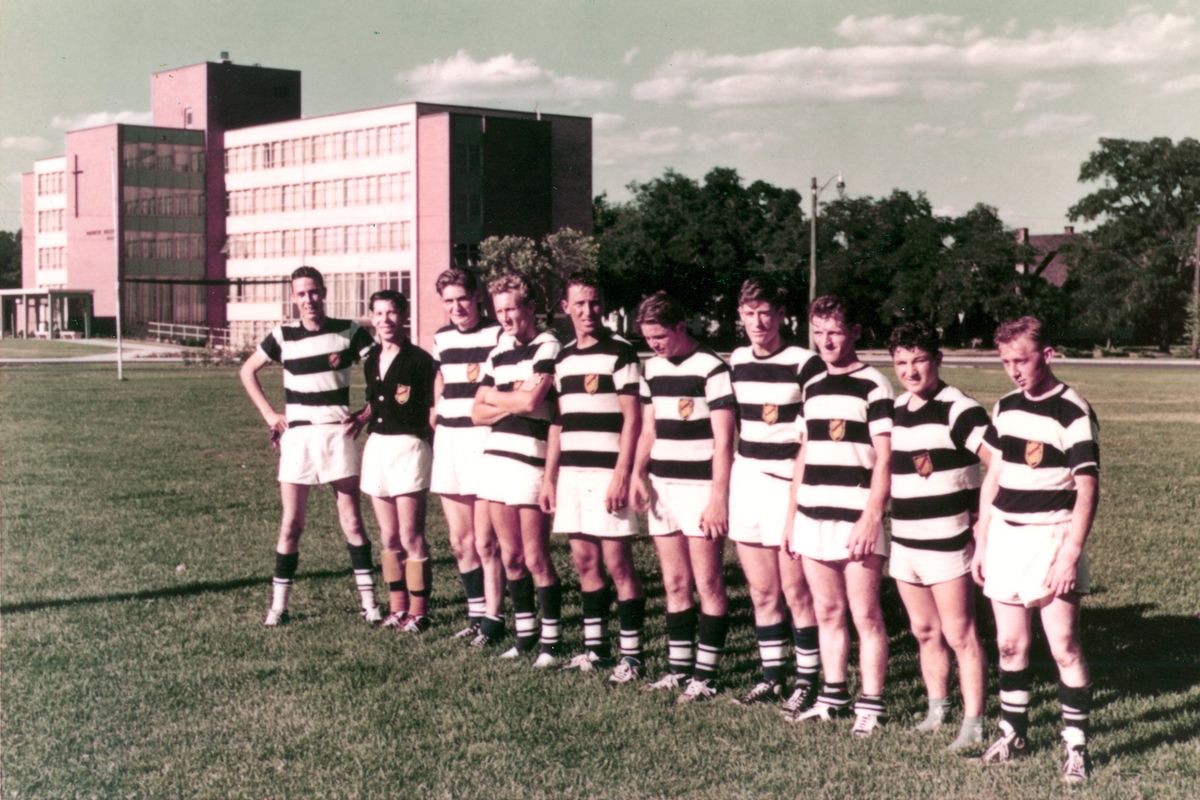Longtime businessman Karl Hoffmann, co-founder of first Spokane soccer teams, dies at age 89

In 1952, Karl Hoffmann arrived in Spokane from Germany at age 18.
He had witnessed World War II tragedies and their aftermath, when his family was in a borough of Berlin and suffered “multiple atrocities” as Soviet troops first occupied the German capital, according to a biographical outline his family provided.
He was there for the postwar division in Berlin, and his family’s home was in an area of the city under American control at that point. Those early days influenced Hoffmann’s life-long compassion for people, said his nephew Roger Felice, a retired attorney.
Hoffmann, 89, died Oct. 28 in Spokane, after complications from a bad fall. He left his mark on Spokane through decades of successes in insurance, financial consulting and as a co-founder of the city’s early soccer teams, the Spokane Spokes and the Spokane Shadow.
Roger Felice’s father, Victor Felice, was an American soldier who met Ursula, one of Hoffmann’s four sisters, in Germany at the end of the war. They married and were living in Spokane when Victor sponsored Hoffmann to come to the U.S.
“My mother was here first, and then Karl came when I was 4,” Roger Felice said. “I think the war ended when he was 10 or 11, so those were significant years in his life.
“At my age then, I’m sure I didn’t appreciate what they’d gone through with the war and how torn up Berlin was at the time, but when he came here, I remember his first job was stocking shelves at Jensen-Byrd.”
Roger Felice isn’t sure how long Hoffmann worked at the hardware store, but eventually he got involved in the insurance industry.
Among Hoffmann’s family, two other sisters, his mother and stepfather also arrived here by 1957.
“I don’t have any doubts in my mind that had he stayed in Germany after that country was rebuilt, he would have been as successful as he was here, because he had the intelligence, personality and commitment. I think from the war, he really learned compassion for people, and he had compassion for truth,” Roger Felice said.
After he arrived in the U.S., Hoffmann also served a short stint with the U.S. Army, which gained him citizenship, said his son-in-law John Wark.
In 1954, Hoffmann married his wife of 50 years, Margery Hunt. She died in 2004, and they had four children: Shannon Wark; Diane Hoffmann, who died in 2014; Marc Hoffmann; and Gretchen McElreath.
Hoffmann had a long career with Equitable Life of Iowa Insurance Company in Spokane and moved into a regional manager position. Years later, the company was sold to the global banking and financial services company, Internationale Nederlanden Group.
With ING, he became vice president of the western U.S. for 10 years. He served on multiple professional boards.
Leaving ING in 2001, he launched Hoffmann & Associates, a financial consulting company that served many regional business leaders, Wark said.
He said Hoffmann was known for philanthropy, as well, such as longtime support for the Vanessa Behan center.
Throughout life, Hoffmann enjoyed sports. From about age 11 to 17, he’d played on a soccer team that won a national championship before he left Germany, Felice said. While he also enjoyed American baseball and played golf for decades, Hoffmann never lost his love for soccer.
He was among young immigrants who introduced soccer to the Inland Northwest, when it was relatively unknown here in the 1950s.
A 2011 Spokesman-Review article described how, in 1957, Hoffmann was sitting around the German-American Club downtown and drinking a beer with his friend, Fred Kirstein. They missed playing soccer.
“We said, ‘Let’s call around and see if we can get a team together,’ ” Hoffmann told The Spokesman-Review.
As a player and coach, he helped start the Spokane Spokes, which had German, Hungarian, Scottish and Dutch immigrants. Most were in their 20s. They first practiced at the old football field on the Gonzaga University campus. In the beginning, the men played against one another and against a fledgling GU soccer team.
The team later moved its practices and games to Franklin Park. By the early 1960s, the Spokane Spokes were traveling regularly to Canada, winning tournaments and garnering recognition in the newspapers.
Wark said Hoffmann also co-founded the first Spokane Shadows soccer team around 1996.
That enterprise later was held by a group that sold to Bobby Brett, owner of Spokane Indians and Chiefs franchises. Brett’s involvement and the early soccer enterprise ended by 2006, amid poor field conditions at Joe Albi Stadium. Another group returned the Shadow in 2014, a top men’s team in the Evergreen Premier League.
“I remember him starting the first soccer program,” said Roger Felice, who as a kid remembers thinking, why don’t you play football? “I never dreamed soccer would take off like it has the last 25 years.”
Hoffmann’s secretary for 27 years, Judy Fosback, recalls his kindness above all else.
“I would describe him as the nicest man I ever met; he cared about people,” she said. “He liked to read and write poetry. I don’t know if he ever shared it with anyone.”
Wark said Hoffmann made an impact in Spokane that included mentoring professionals, providing insurance, and later helping people invest or retire – until he retired at about age 70.
“He was very well-known by the business community here,” Wark said. “Everyone just loved being around him.
“He’s one of the fairest and most generous guys you’d ever meet.”